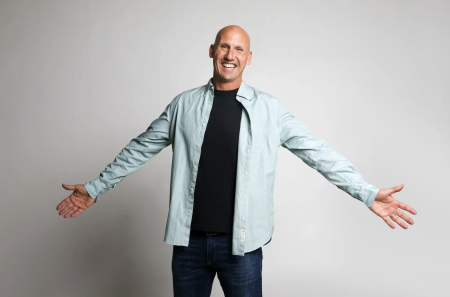Hootie & the Blowfish artist on finding faith in addiction recovery, foray into Christian music

Known to millions as the drummer of the Grammy Award-winning band Hootie & the Blowfish, Jim “Soni” Sonefeld once appeared to have it all — a successful career, a loving family and a public image that masked his private struggles. Beneath the surface, however, he grappled with inner demons.
“I moved from being a recreational drinker to habitual drinker to a medicinal drinker to full-blown alcoholism,” the 60-year-old artist told The Christian Post. “It's at this point that I am really faced with, what am I doing? How do I even deal with this? And it took probably four to five years of very painful, negative, dark times to find an answer.”
In 2004, Sonefeld decided to seek help through a 12-step program. Which, to his surprise, promoted the biblical principles he’d learned as a child.
“A friend had gotten me a biblical recovery book. So it had the 12 steps, but it also had the Bible […] the principles of both of them, I realized, were much closer than I'd ever thought.”
Raised in a Christian home in the Midwest, Sonefeld knew the Bible, but felt conflicted by the dual images of God he encountered: one of a loving Jesus and another of a powerful, wrathful deity.
“That was intimidating and felt like a burden to me,” he reflected.
“I was without any church. I dabbled at best for years, and then as the band took off, I felt like, hey, life is good, right? I'm succeeding. I'm giving to charity. I'm starting a family. I felt like I was doing the right things that I was taught,” he said.
But through his recovery journey and exposure to the 12-step program, the “Hold My Hand” artist found a new perspective on faith; one rooted in compassion and grace. He realized that many of the biblical principles he had pushed back against were, in fact, healthy frameworks for a fulfilling life.
“I started learning to release, as a 40-year-old man, some of the hang-ups I had with the way religion was taught to me as a young kid, and started accepting that a lot of the principles that I pushed back on were actually very healthy for me, and moved forward in recovery and with a Bible,” he said.
Now sober for nearly two decades, Sonefeld, who authoredSwimming with the Blowfish - Hootie, Healing, and One Hell of a Ride, has faced some difficult personal challenges, including divorce, but ultimately found the joy of a second chance at love. Now, after 16 years of marriage, he and his wife find themselves in a new season, as their youngest children head off to college.
Today, he helps others seeking freedom from addiction and uses his platform to share the transformative power of faith and adhering to the principles of Jesus.
“I can both sing and speak and give testimony, and that seems like a really good expressive outlet for me,” he said.
Reflecting on his journey with Hootie & the Blowfish, the artist noted how his career has evolved from mainstream music to faith-centered themes. He recalled the band’s hiatus in 2008 as a period that deepened his spiritual focus.
“We had a period in 2008 where I had been clean and sober for a few years and really was on a good faith path, but we decided we needed to, as a band, go into dormancy," he recalled. "We needed just to stop the massive touring and making records and regroup. I went through my most profound period during that time, where I was able to focus on being a better husband and father and spent a lot more time in the Bible and with my recovery principles. That was a very fruitful time as well with my music,” he said.
This period also marked Sonefeld’s first foray into Christian music, as he began channeling his faith journey into solo albums. And though he still tours with Hootie & the Blowfish, he approaches his old songs with a renewed sense of purpose and gratitude. Performing hits like “Hold My Hand” and “Let Her Cry” is, in a way, a reminder of the journey he’s been on.
“I decided I really just wanted to sing and write about positive things; a celebration of faith and transformation,” he shared. “I'd written a lot, even with Hootie, about romantic love and broken-heartedness, and that whole journey. But as an older man, I felt like I really wanted to celebrate the positive side. So I really have only written songs that are a celebration of Jesus, new life, rebirth […] I write a lot about my recovery.”
His latest project, a Christmas album titled Light of Joy, emphasizes the joyful anticipation of Jesus' birth while reflecting on the warm, secular rituals that evoke family memories.
Written with CCM songwriters Martin Chalk and David Spencer, the album includes tracks like "Light of Joy (Gloria)" — a soaring anthem celebrating the Nativity — that embody his reverence for Jesus' arrival, while songs like "Mama in the Kitchen" leans into memories of Christmases past.
“I want to celebrate the birth of a Savior, but I grew up also in a cultural Christmas with Christmas trees and lights and Santa and that whole idea,” he said.
“I think it’s OK that there's both. I struggle with people who are hardlining and wanting to completely discount the cultural Christmas and say, ‘No, it's only about Jesus.’ Yeah, the reason for the season is the birth of Jesus. But there are a lot of cultural things that have happened that are fun, acceptable and loving ways to also celebrate the, ‘Ho, ho Christmas tree tinsel Christmas/’ […] Celebrate both; it's OK. But just remember the reason.”
With the holiday season approaching, Sonefeld hopes Light of Joy invites listeners to embrace both the sacred and sentimental joys of Christmas while offering a sense of connection and hope. It's only through Christ, he stressed, that true freedom and joy are found.
"For those struggling with addiction or mental health, especially during the holidays, there is always help available," he emphasized. "It takes courage to reach out, but support exists through recovery programs, counseling and community. I wouldn’t be here without taking that step.”
Leah M. Klett is a reporter for The Christian Post. She can be reached at: leah.klett@christianpost.com





















